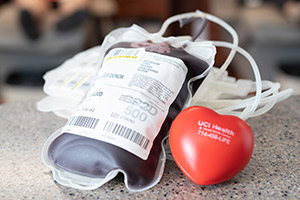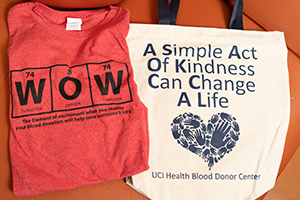Giving blood so others may live
Critical shortages highlight need for more donors

"Donating blood is an amazing gift," says Dr. Minh-Ha Tran, medical director of UCI Health transfusion and blood donor services. "It’s also a pretty quick process." Photo by Michael Der
Every day in hospitals across the country, health professionals provide their patients with lifesaving blood products. But it’s not easy. A nationwide shortage of blood has put severe stress on U.S. — and Orange County — healthcare systems.
Dr. Minh-Ha Tran, medical director of UCI Health transfusion and blood donor services, and a UCI School of Medicine professor of pathology, explains the critical need to increase regular blood donations.
Why are we seeing chronic U.S. blood shortages?
Since 2015, surveys show that U.S. blood donations have declined steeply, with only about 5% of eligible U.S. adults now participating. It’s really only among baby boomers that we see the rate of donation is fairly stable. Among younger age groups, the rate is dropping even more.
Since there is no substitute for blood, recruiting new donors across all age groups is of utmost importance.
Did the pandemic make things worse?
Yes. Shortages intensified during the COVID-19 pandemic because of the shift to distance learning and remote work environments, which dealt a significant blow to blood collection here and across the country. Mobile blood drives at high schools, colleges and businesses ground to a halt. Regular donors instead had to go to a blood collection center where many people feared they might be exposed to COVID-19. Even when mobile blood drives resumed, social-distancing mandates limited the number of people who could give blood at the same time.
And by late 2021, supply disruptions caused by pandemic-related staffing shortages and increased delivery fleet costs further reduced the collection and distribution of blood. Today, as things have eased, we are working as hard as we can to rebuild our supplies and donor base.
Does UCI Medical Center have a special need for blood products?

Yes, as a Level I trauma center, we are Orange County’s busiest emergency department. Typically, a medical patient needing a transfusion requires about one or two units of blood. Major surgical cases may require up to four units a day. But a trauma patient with catastrophic injuries may need 40 to 50 units of blood.
It’s common for us to order 20 to 30 units of red cells at a time, both to support ongoing transfusion needs and to partially replenish inventory levels in preparation for the next major trauma. Our vendors are only able to supply these units if they are getting sufficient donations from first-time and repeat blood donors. UCI Health is blessed with amazing donors who come to our blood donation centers in Orange and Irvine. They have been tremendous, responding to the challenge and helping us build back our inventory levels.
What will ease chronic blood shortages?
The best way to make a difference is for healthy people to become regular donors of whole blood or platelets, a type of blood cell that helps stop bleeding and promotes healing. You can donate whole blood every 56 days. Many of our platelet donors give as often as every two weeks. People can also help by responding to appeals from blood centers when critical shortages arise. If a regional or local blood center posts an appeal for blood donations, please make that appointment and donate!
Remember, the blood transfused into a patient today was collected, tested and processed days or weeks ago. Blood products have a limited shelf life (42 days for red blood cells and five days for platelets). It’s a delicate balance. We must be careful to avoid building excess inventory that could result in high discard rates, wasting this life-giving resource.
What motivates your donors to give blood?

Some donors have had family members who have been hospitalized and needed a transfusion. Others have had a blood transfusion at some point in their lives and want to give back. Many more people know there is a great need or hear about a crisis and want to help.
In truth, donating blood is an amazing gift. It’s also a pretty quick process. It only takes about an hour to donate whole blood and about two or three hours for platelets. Donors tell us they get great satisfaction knowing they’re helping to save another person’s life. There is something very special about that.
Learn more about becoming a blood donor ›
How you can help
Join our blood drive at the Honda Center on Thursday, July 14 from 9 a.m. to 3 p.m. Schedule your appointment now ›
The UCI Health bloodmobile also will be at the Great Park in Irvine on July 19, Aug. 16 and Sept. 20. Make your appointment today ›




